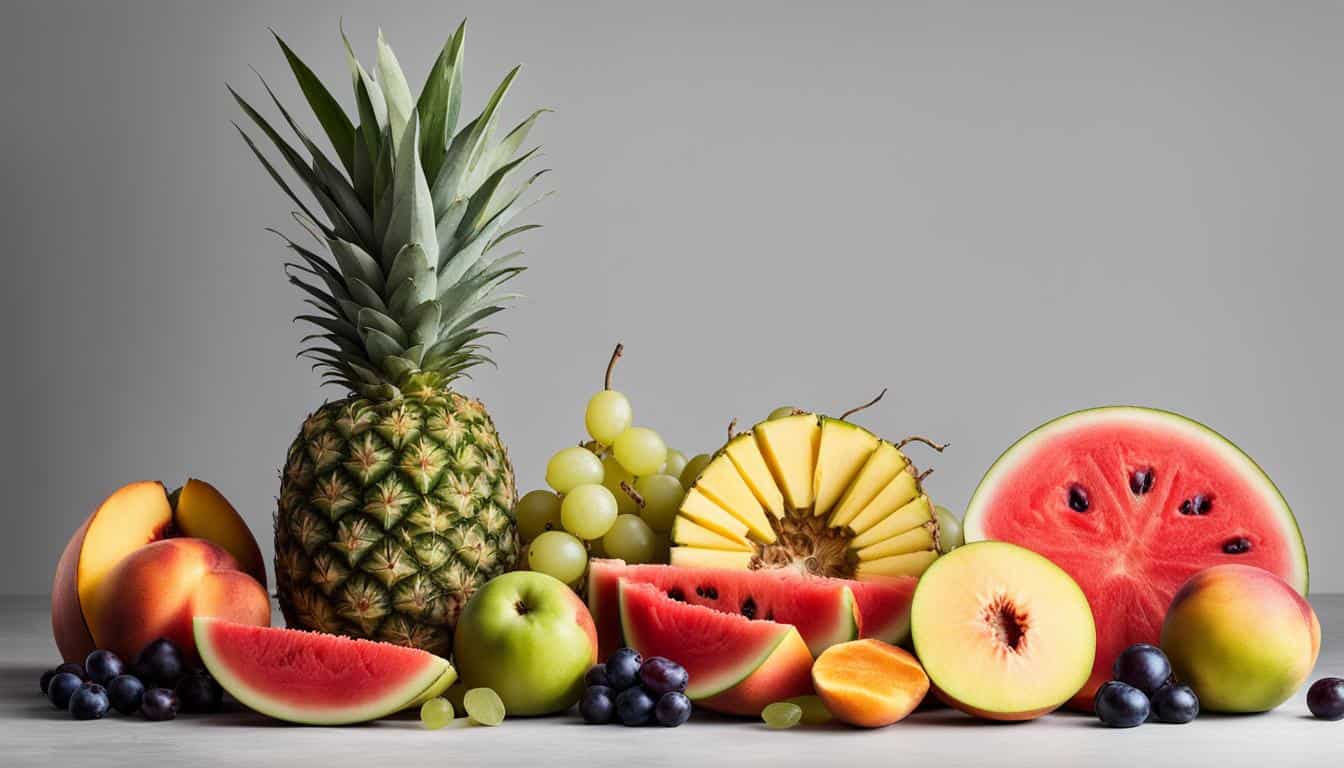Savoring the juicy goodness of fresh fruit is a delightful experience, but have you ever considered enjoying fruit without its skin? From peeled apples to skinless peaches, there’s a whole world of possibilities waiting to be explored. In this article, I will take you on a journey of savoring fruit without skin, highlighting the various options and benefits of indulging in these naked fruits.
Key Takeaways:
- Discover the joy of savoring fruit without its skin
- Explore options like skinless apples, peaches, and kiwis
- Appreciate the vibrant colors and refreshing taste of naked fruits
- Enjoy the health benefits of peeled fruit, including essential vitamins and dietary fiber
- Embrace the versatility of skinless citrus in both sweet and savory dishes
The Pleasure of Fresh Fruits: A Sensory Experience
Savoring fresh fruits is a sensory experience that engages all your senses. The vibrant colors, such as the ruby red of strawberries and the sunny yellow of bananas, visually stimulate your appetite. Fruits emit alluring aromas, from the scent of a ripe peach to the freshly sliced pineapple. The textures of fruits vary, from the smooth skin of apples to the slightly fuzzy surface of peaches. The sound of biting into a crisp apple or snapping a strawberry adds an auditory element to the experience. Of course, the most crucial sense is taste, with the combination of sweetness, tartness, and various flavor notes creating a symphony on your palate.
To enhance your sensory journey, imagine yourself transported to a tropical paradise as you savor the vibrant colors of tropical fruits like mangoes and papayas. Close your eyes and inhale the enticing aromas of a juicy watermelon or a freshly cut pineapple. Allow the texture of a juicy pear or a creamy banana to engage your sense of touch. Take a moment to appreciate the sweetness of grapes or the tartness of a green apple. Savoring each bite of fresh fruit is a celebration of nature’s flavors and the pleasure they bring.
The Benefits of Engaging Your Senses
Engaging your senses while enjoying fresh fruits not only enhances your sensory experience but also provides nutritional benefits. Fresh fruits are packed with essential vitamins like vitamin C, which supports immunity, and vitamin A, which promotes healthy skin. They are also rich in dietary fiber, aiding digestion and providing a feeling of fullness. The vibrant colors of fruits are often a visual indication of the presence of antioxidants that protect your body against harmful free radicals and reduce the risk of chronic diseases. Plus, the hydration and natural sugars found in fruits keep you refreshed and energized throughout the day.
| Nutrients | Benefits |
|---|---|
| Vitamins | Supports immunity, promotes healthy skin |
| Dietary Fiber | Aids digestion, provides feeling of fullness |
| Antioxidants | Protects against free radicals, reduces risk of chronic diseases |
| Hydration | Keeps you refreshed and energized |
By engaging your senses in the pleasure of fresh fruits, you not only enjoy a delightful sensory experience but also nourish your body with vital nutrients. So, take a moment to appreciate the vibrant colors, enticing aromas, and refreshing tastes of fresh fruits, and indulge in a sensory feast that delights both your palate and your health.
The Health Benefits of Fresh Fruits
Savoring fresh fruits isn’t just a sensory pleasure; it’s also an investment in your health. Fruits are rich in essential nutrients, providing a wide range of health benefits for your body.
- Essential Nutrients: Fresh fruits are packed with vital vitamins, such as vitamin C, vitamin A, and various B vitamins. These nutrients support your immune system, promote healthy skin, and contribute to overall well-being.
- Dietary Fiber: Fruits are an excellent source of dietary fiber, which aids digestion, keeps you feeling full, and helps regulate blood sugar levels. Including fiber-rich fruits in your diet can promote a healthy gastrointestinal system and support weight management.
- Antioxidants: Many fruits contain powerful antioxidants, such as flavonoids and polyphenols. These antioxidants combat free radicals, reduce inflammation, and help protect against chronic diseases, including heart disease, cancer, and neurodegenerative disorders.
- Hydration: Fruits have a high water content, which contributes to your daily hydration needs. Staying hydrated is essential for optimal bodily functions, healthy skin, and overall well-being.
- Natural Sugars: Unlike processed snacks and desserts, fresh fruits contain natural sugars that provide a sweet taste without the added sugars. Choosing fruits as a healthier alternative can satisfy your sweet cravings while providing essential nutrients.
Make it a habit to include a variety of fresh fruits in your daily diet to enjoy these health benefits. Whether it’s adding slices of colorful fruits to your salads, blending them into smoothies, or enjoying them as a refreshing snack, fresh fruits are nature’s gift for your well-being.
A table highlighting the essential nutrients found in common fresh fruits:
| Fruit | Essential Nutrients |
|---|---|
| Oranges | Vitamin C, dietary fiber |
| Apples | Vitamin C, dietary fiber |
| Bananas | Vitamin B6, potassium, dietary fiber |
| Strawberries | Vitamin C, manganese, dietary fiber, antioxidants |
| Grapes | Vitamin C, vitamin K, antioxidants |
Including a wide variety of fresh fruits in your diet can provide an array of essential nutrients and health benefits. Start savoring the goodness of fresh fruits today for a healthier and more vibrant lifestyle.
Savoring the Season: A Bounty of Choices
One of the joys of savoring fresh fruits is the changing variety throughout the year. Each season brings its own harvest, offering a diverse range of flavors and textures.
Spring – Burst of Freshness and Sweetness
In spring, strawberries, cherries, and apricots burst with freshness and sweetness. These vibrant and colorful fruits awaken the senses and are perfect for enjoying on a warm, sunny day. The juicy sweetness of strawberries, the tartness of cherries, and the delicate flavor of apricots create a delightful medley of tastes. Whether enjoyed on their own or added to salads, smoothies, or desserts, these seasonal fruits bring a refreshing touch to any dish.
Summer – Juicy and Refreshing
The warmer months of summer bring an abundance of watermelons, peaches, and blueberries. These fruits are not only incredibly flavorful but also hydrating and refreshing, making them a must-have during picnics and outdoor gatherings. Biting into a juicy slice of watermelon, with its vibrant red flesh and sweet juice running down your chin, is a quintessential summer experience. Peaches, with their fuzzy skin and juicy yellow flesh, offer a perfect balance of sweetness and tang. And blueberries, with their burst of flavor and deep blue hue, are a versatile ingredient for both sweet and savory recipes.
Autumn – Crispness and Earthy Flavors
As autumn arrives, apples, pears, and grapes take center stage. These fruits offer crispness and earthy flavors that complement the changing colors of the season. From the juicy crunch of a freshly picked apple to the smooth texture of a ripe pear, autumn fruits provide a delightful contrast to the summer sweetness. The rich flavors of grapes, whether enjoyed fresh or used in wine-making, add a touch of luxury to fall gatherings and celebrations.
Winter – Zesty and Refreshing
In winter, citrus fruits like oranges, grapefruits, and clementines brighten up the season with their zesty and refreshing qualities. The vibrant colors and invigorating aromas of these fruits bring a burst of sunshine to cold winter days. Whether enjoyed as a snack, squeezed into fresh juices, or used in desserts and savory dishes, citrus fruits infuse winter meals with a sense of brightness and vitality.
Savoring the season means embracing the changing variety of fruits and indulging in their diverse range of flavors and textures. From the freshness of spring to the juiciness of summer, the crispness of autumn, and the zesty allure of winter, seasonal fruits are a true delight for the palate.
The Ritual of Savoring: Mindful Eating
Savoring fresh fruits can become a mindful practice, allowing you to fully appreciate each bite and derive greater satisfaction from your meals. Slow down and take your time to eat, avoiding rushing through your meal. Engage your senses by appreciating the colors, smells, and textures of the fruit before you. Chew your food slowly and thoroughly, allowing the flavors to develop on your palate. Eliminate distractions and fully focus on the experience of enjoying the fruit. Take a moment to express gratitude for the nourishment and pleasure that fresh fruits bring to your life.
When it comes to mindful fruit consumption, it’s not just about nourishing your body with vitamins and minerals; it’s also about nourishing your soul and creating a deeper connection with your food. By savoring each bite, you can fully immerse yourself in the present moment, appreciating the flavors, textures, and natural sweetness that fresh fruits provide.
“Mindful eating is more than just tasting the food; it’s about being present and fully engaging in the act of eating.”
Appreciate Each Bite
With each bite of a juicy strawberry or a crisp apple, take a moment to pay attention to how it feels on your tongue, the burst of flavor that fills your mouth, and the satisfaction it brings. Engage your senses to fully experience the beauty of fresh fruits and the nourishment they offer.
Express Gratitude
Expressing gratitude for the food you eat is an essential aspect of mindful eating. Take a moment before you begin your meal to offer thanks for the abundance of fresh fruits and the nourishment they provide. This practice helps cultivate a sense of appreciation and brings a deeper level of enjoyment to your fruit consumption.
“Gratitude turns what we have into enough.”
By practicing mindful eating and savoring fresh fruits, you can create a ritual that not only nourishes your body but also enhances your overall well-being. So, the next time you indulge in a succulent piece of watermelon or savor the tangy sweetness of a pineapple, remember to slow down, engage your senses, and express gratitude for the mindful fruit consumption that brings joy to your life.
| Mindful Eating Benefits | Fresh Fruits |
|---|---|
| Enhances the enjoyment of meals | Offers a wide range of flavors and textures |
| Promotes mindful consumption | Provides essential vitamins and minerals |
| Encourages gratitude and appreciation | Contributes to overall well-being |
The Art of Savoring
Savoring fresh fruits is more than just eating; it’s a celebration of nature’s bounty and a way to nurture both your body and soul. By engaging your senses, appreciating the health benefits, and practicing mindful eating, you can elevate the simple act of enjoying fresh fruits into a fulfilling and enriching experience. Whether you’re biting into a crisp apple or relishing the juiciness of a ripe mango, savor each moment and let the deliciousness of nature’s gifts brighten your day.
Engaging your senses while enjoying fresh fruits enhances the experience and allows you to fully appreciate their vibrant colors, enticing aromas, and tantalizing textures. Take a moment to observe the stunning array of colors that nature provides, from the deep red of a strawberry to the bright orange of a slice of papaya. Inhale deeply and let the sweet, citrusy scent of a ripe orange transport you to an orchard filled with sunshine. As you take a bite, feel the smoothness of the fruit’s skin against your tongue and revel in the burst of flavors that dance on your taste buds. By truly engaging with your senses, you can immerse yourself in the beauty and pleasure of each fruit.
Appreciating the health benefits of fresh fruits adds another layer of fulfillment to your experience. Fresh fruits are packed with essential nutrients, vitamins, and antioxidants that promote a healthy body and mind. They provide a natural source of hydration, fiber, and beneficial sugars without the unnecessary additives found in processed foods. By savoring fresh fruits, you nourish your body and appreciate the vibrant energy they bring to your life.
Mindful eating transforms the act of consuming fresh fruits into a meditative practice. By savoring each bite, you create a deeper connection with the food and cultivate a sense of gratitude for the nourishment it provides. Take the time to chew slowly, allowing the flavors to fully develop and engage your taste buds. Eliminate distractions and focus solely on the act of savoring the fruit. By being present in the moment and savoring each bite mindfully, you can elevate the enjoyment of fresh fruits and enhance your overall well-being.
So let the art of savoring fresh fruits become a daily ritual in your life. Take a moment to appreciate the celebration of nature’s bounty, engage your senses, enhance your health, and enjoy the fulfilling experience of savoring each delicious bite. Elevate your fresh fruit enjoyment and let it nourish not only your body but also your soul.

Discovering Egg Fruit: Creamy and Unique
The egg fruit, also known as chesa, is a tropical fruit that captivates with its vibrant yellow-orange color and creamy texture. When you first lay eyes on it, its velvety surface begs to be touched and tasted. But it’s when you take a bite that the magic truly happens. The flesh inside is thick and buttery, melting in your mouth with each indulgent bite.
What sets the egg fruit apart is its unique ability to mimic the feel and color of a hard-boiled egg yolk. It’s a characteristic that adds a touch of intrigue to this already versatile fruit. With its vibrant hues and smooth consistency, it can be used in a variety of culinary creations, from sweet desserts to savory dishes. Let your imagination run wild and discover the delightful twist that the egg fruit can bring to your favorite recipes.

Enjoying Egg Fruit: Seasonal Delight
Egg fruit, also known as chesa fruit, is a tropical delicacy that delights taste buds with its unique flavor and creamy texture. This tropical fruit has a vibrant yellow-orange color and is available during specific seasons throughout the year, typically from October to March. It thrives in warm and humid climates, making countries like Mexico, Belize, Guatemala, and El Salvador ideal growing locations.
When selecting egg fruit, look for firm and blemish-free fruits, as these indicate freshness. The bright yellow-orange color is a sign of ripeness and optimal flavor. To store egg fruit and extend its shelf life, place it in the refrigerator. This helps maintain its freshness and allows you to enjoy this tropical delight for a longer period.
Egg fruit is a versatile cooking ingredient, lending its unique taste and creamy texture to various dishes. Whether you’re using it in jams, jellies, pancakes, waffles, muffins, or bread, egg fruit adds a touch of tropical goodness to your favorite baked goods. Its ability to enhance both sweet desserts and savory meals makes it a valuable addition to any kitchen.
So, next time you come across egg fruit or chesa fruit, savor its seasonal availability and unique qualities. Experiment with different recipes and explore the delightful ways this tropical fruit can elevate your culinary creations.
Creative Recipe Idea: Egg Fruit Pancakes
For a delicious and tropical twist on breakfast, try making egg fruit pancakes. Start by mashing ripe egg fruit and adding it to your favorite pancake batter. Cook the pancakes until golden brown and top them off with a drizzle of maple syrup and a sprinkle of toasted coconut flakes. The creamy texture and vibrant flavor of the egg fruit will transform ordinary pancakes into a delightful tropical treat.
| Egg Fruit Benefits |
|---|
| Rich in antioxidants |
| Good source of vitamins and minerals |
| High in dietary fiber |
| Versatile cooking ingredient |

The Health Benefits of Egg Fruit
Egg fruit, also known as chesa fruit, is not only delicious but also packed with a range of health benefits. From antioxidants to vitamins, dietary fiber, and minerals, this tropical fruit is a nutritional powerhouse that can support your overall well-being.
Antioxidant Powerhouse
One of the key benefits of egg fruit is its high antioxidant content. These antioxidants help protect your body from harmful free radicals, which can cause cellular damage and contribute to the development of various diseases. By incorporating egg fruit into your diet, you can boost your antioxidant intake and enhance your body’s natural defense system.
A Vitamin-Rich Fruit
Egg fruit is a fantastic source of essential vitamins, including vitamin C and vitamin A. Vitamin C plays a crucial role in supporting a healthy immune system, while vitamin A supports overall health, especially in maintaining good vision. By enjoying egg fruit, you can naturally increase your vitamin intake and support your body’s optimal functioning.
Promotes Digestive Health
With its dietary fiber content, egg fruit is an excellent choice for promoting digestive health. Dietary fiber helps regulate bowel movements, prevents constipation, and supports a healthy digestive system. By including egg fruit in your diet, you can ensure you’re getting an adequate amount of fiber to support optimal digestion.
Essential Minerals for Your Body
Egg fruit is also rich in essential minerals like potassium, magnesium, and calcium. Potassium plays a vital role in maintaining healthy blood pressure levels and proper muscle function. Magnesium contributes to various bodily functions, including nerve and muscle function, energy production, and bone health. Calcium, on the other hand, is essential for strong bones and teeth. By consuming egg fruit, you can ensure your body receives these vital minerals to support optimal health.
When selecting egg fruit, look for firm and unblemished fruits with a vibrant yellow-orange color. These qualities indicate that the fruit is ripe and ready to be enjoyed. Incorporate egg fruit into your diet by consuming it fresh or using it as a versatile cooking ingredient. By adding egg fruit to your meals, you’ll not only enhance the flavors but also reap the many health benefits it offers.

Enjoy the unique taste and creamy texture of egg fruit while nourishing your body with antioxidants, vitamins, dietary fiber, and minerals. Make this tropical delight a regular part of your diet and experience the health benefits it brings.
Conclusion
Whether I’m savoring the vibrant colors and flavors of fruit without skin or indulging in the tropical delight of egg fruit and peaches, my journey into the world of fresh fruits has been nothing short of extraordinary. The simple act of enjoying these nature’s gifts goes beyond mere nourishment. It’s about engaging my senses, appreciating the health benefits, and embracing the versatile cooking ingredient that fruits offer.
By savoring each bite with mindfulness and gratitude, I have elevated the experience of savoring fresh fruits into a fulfilling and enriching sensation. Every time I sink my teeth into a colorful apple, the crispness and juiciness awaken my senses and bring a smile to my face. When I relish the sweetness of a perfectly ripe peach, the creamy texture dances on my tongue as a tropical symphony of flavors delights my palate. And when I discover the rich and velvety indulgence of egg fruit, it’s as if I’ve uncovered a hidden treasure of creamy perfection.
So, whether I’m savoring fruit without skin, exploring the treasures of egg fruit and peaches, or delighting in the vibrant colors and creamy textures that fresh fruits bring, I am reminded of the wonders of nature’s bounty. Each bite is a celebration, an opportunity to nourish my body and soul, and a chance to fully appreciate the beauty and deliciousness that fruits provide. Let these delightful fruits brighten your day and open your senses to the joys of savoring nature’s gifts.
FAQ
What does it mean for a fruit to be “skinless”?
When a fruit is described as “skinless,” it means that the outer layer or peel of the fruit has been removed, leaving only the flesh or pulp.
Are there specific fruits that are commonly eaten without their skin?
Yes, some examples of fruits that are often consumed without their skin include citrus fruits like oranges and grapefruits, apples, peaches, and kiwis.
Why do some people prefer to eat fruit without the skin?
There are several reasons why someone might prefer to eat fruit without the skin. Some may find the texture or taste of the skin unpleasant, while others may do so for dietary or personal preferences.
Does removing the skin affect the nutritional value of the fruit?
In most cases, removing the skin of a fruit does not significantly impact its nutritional value. The majority of the vitamins, minerals, and fiber are found in the flesh of the fruit rather than the skin.
How can I safely remove the skin from a fruit?
To remove the skin from a fruit, you can use a knife to carefully peel it away or use a peeler specifically designed for fruits. It is important to handle the fruit and tools safely to avoid any accidents.
Can I eat the skin of all fruits?
Not all fruit skins are suitable for consumption. Some fruit skins, such as those of bananas or watermelons, are typically not eaten due to their texture or taste. It is best to refer to specific fruit guides or consult with a knowledgeable source to determine if a fruit’s skin is edible.
Are there any precautions I should take when consuming skinless fruits?
It is advisable to wash the fruit thoroughly before removing the skin to ensure that any dirt or contaminants on the outside are removed. Additionally, if you have any allergies or sensitivities to specific fruits, be cautious when consuming them without the skin.





Leave a Reply